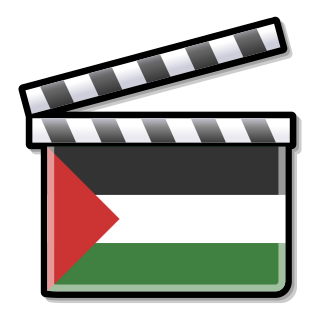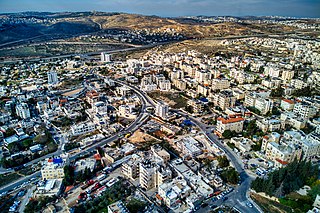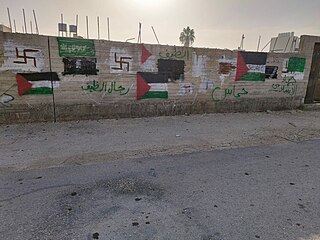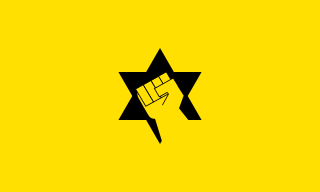
Palestinian Christians are Palestinians who are Christians. They include citizens of both Israel and the State of Palestine and members of the Palestinian diaspora. In the wider definition, including people with full or partial Palestinian Christian ancestry, the term can be applied to an estimated 500,000 people worldwide as of the year 2000. Palestinian Christians belong to one of a number of Christian denominations, including Eastern Orthodoxy, Oriental Orthodoxy, Catholicism, Anglicanism, Lutheranism, other branches of Protestantism and others. Bernard Sabella of Bethlehem University estimates that 6% of the Palestinian population worldwide is Christian and that 56% of them live outside of the region of Palestine. In both the local dialect of Palestinian Arabic and in Classical Arabic or Modern Standard Arabic, Christians are called Nasrani or Masihi. Hebrew-speakers call them Notzri, which means Nazarene.

The Palestinian territories are the two regions of the former British Mandate for Palestine that have been occupied by Israel since the Six-Day War of 1967, namely the West Bank and the Gaza Strip. The International Court of Justice (ICJ) has referred to the West Bank, including East Jerusalem, as "the Occupied Palestinian Territory", and this term was used as the legal definition by the ICJ in its advisory opinion of July 2004. The term occupied Palestinian territory was used by the United Nations and other international organizations between October 1999 and December 2012 to refer to areas controlled by the Palestinian National Authority, but from 2012, when Palestine was admitted as one of its non-member observer states, the United Nations started using exclusively the name State of Palestine. The European Union (EU) also uses the term "occupied Palestinian territory". The government of Israel and its supporters use the label "disputed territories" instead.

Arab–Israeli peace projects are projects to promote peace and understanding between the Arab League and Israel in different spheres. These are part of a broader attempt at a peace process between Palestinians and Israelis. Sponsors of such projects can be found both in Israel and Palestine.
If Americans Knew is a nonprofit organization based in Riverside County in Southern California, that focuses on the Israeli–Palestinian conflict and the foreign policy of the United States regarding the Middle East, offering analysis of American media coverage of these issues. The group's website declares its aim is to provide "what every American needs to know about Israel/Palestine." The site is critical of U.S. financial and military support of Israel. It has accused The New York Times and other mainstream news organizations of being biased in favour of Israel.

As-Sa'iqa officially known as Vanguard for the Popular Liberation War - Lightning Forces, is a Palestinian Ba'athist political and military faction created and controlled by Syria. It is linked to the Palestinian branch of the Syrian-led Ba'ath Party, and is a member of the broader Palestine Liberation Organization (PLO), although it is no longer active in the organization. Its Secretary-General is Dr. Mohammed Qeis.
The Sabeel Ecumenical Liberation Theology Center is a Christian liberation theology organization based in Jerusalem. It was founded by Palestinian Anglican priest, Rev. Naim Ateek, the former Canon of St. George's Cathedral in Jerusalem.

Rashid Ismail Khalidi is a Palestinian-American historian of the Middle East and the Edward Said Professor of Modern Arab Studies at Columbia University. He served as editor of the Journal of Palestine Studies from 2002 until 2020, when he became co-editor with Sherene Seikaly.
The Palestine–Israel Journal is an independent, non-profit, Jerusalem-based quarterly that aims to shed light on and analyze freely and critically, the complex issues dividing Israelis and Palestinians. In 2006 it was a candidate for the UNESCO-Madanjeet Singh Prize for the Promotion of Tolerance and Non-Violence and was recognized with a mention of honor for "its outstanding contribution to this great cause". In 2012, co-editors Hillel Schenker and Ziad Abuzayyad were awarded the Outstanding Contribution to Peace Award at the eighth International Media Awards held on May 5.

Ameinu is an American Jewish Zionist organization. Established in 2004 as the successor to the Labor Zionist Alliance, it is the continuation of Labor Zionist activity in the United States that began with the founding of Poale Zion, which came together in the period 1906.

Cinema of Palestine is relatively young in comparison to Arab cinema as a whole. Palestinian films are not exclusively produced in Arabic and some are even produced in English and French. Elia Suleiman has emerged as one of the most notable working Palestinian directors.

Beit Hanina is an Arab Palestinian neighborhood in East Jerusalem. It is on the road to Ramallah, eight kilometers north of central Jerusalem, at an elevation of 780 meters above sea level. Beit Hanina is bordered by Pisgat Ze'ev and Hizma to the east, Ramot, Ramat Shlomo and Shuafat to the south, Beit Iksa and Nabi Samwil to the west, and Bir Nabala, al-Jib, Kafr Aqab and ar-Ram to the north.

Palestinian art is a term used to refer to paintings, posters, installation art and other visual media produced by Palestinian artists.

Naseer H. Aruri was an American scholar-activist and expert on Middle East politics, U.S. foreign policy in the Middle East and human rights. Aruri was Chancellor Professor (Emeritus) of Political Science, having served on the faculty of the University of Massachusetts-Dartmouth from 1965-1998. In 1993, he was the recipient of the College of Arts and Sciences “Distinguished Research Award”. Aruri’s papers have been preserved and are on display at the Claire T. Carney Library Archives and Special Collections at UMASS-Dartmouth.
Zahi W. Khouri is a Palestinian-American businessman and entrepreneur, who is best known for his involvement in numerous business ventures in the Palestinian territories.
The Palestine Center is an independent educational program based in Foggy Bottom, Washington, D.C. Their focus is on the Israeli–Palestinian conflict and other Middle East issues.

Racism in the Palestinian territories encompasses all forms and manifestations of racism experienced in the Palestinian Territories, of the West Bank, Gaza, and East Jerusalem, irrespective of the religion, colour, creed, or ethnic origin of the perpetrator and victim, or their citizenship, residency, or visitor status. It may refer to Jewish settler attitudes regarding Palestinians as well as Palestinian attitudes to Jews and the settlement enterprise undertaken in their name.

Kahanism is a religious Zionist ideology based on the views of Rabbi Meir Kahane, founder of the Jewish Defense League and the Kach party in Israel.

The Annapolis Conference was a Middle East peace conference held on 27 November 2007, at the United States Naval Academy in Annapolis, Maryland, United States. The conference aimed to revive the Israeli–Palestinian peace process and implement the "Roadmap for peace". The conference ended with the issuing of a joint statement from all parties. After the Annapolis Conference, the negotiations were continued. Both Mahmoud Abbas and Ehud Olmert presented each other with competing peace proposals. Ultimately no agreement was reached.

The two-state solution to the Israeli–Palestinian conflict envisions an independent State of Palestine alongside the State of Israel, west of the Jordan River. The boundary between the two states is still subject to dispute and negotiation, but it is mainly based on the 1967 lines.
Los Angeles County contains a community of Palestinian Americans.













